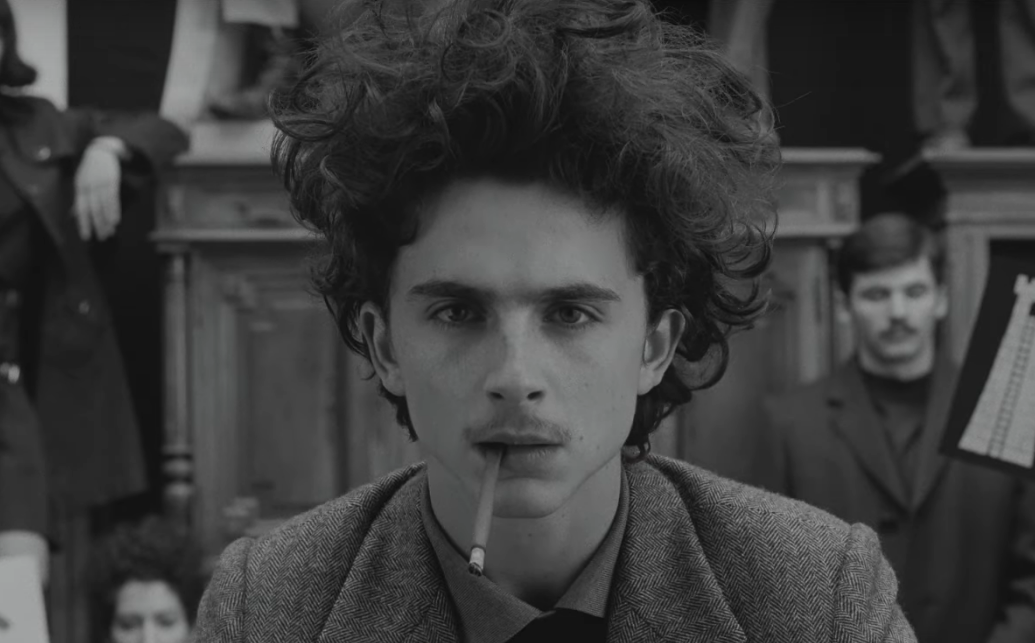Scope around certain movie sites or Film Twitter and you may find reference to a slated upcoming DC comics adaptation title Justice League Dark—Guillermo del Toro and Doug Liman have been attached, so it’s probably not too embarrassing. The French Dispatch, in a similar naming fashion, could really be title Wes Anderson Dark, or even Wes Anderson After Dark. The film is primarily presented in black-and-white academy ratio; in the occasional color sequences its palette is still a grim, swirling miasma of moonlit tones. And the themes and subject matter couldn’t be accused of indulging anyone’s inner child, wonderful as the likes of Rushmore and Fantastic Mr. Fox remain. Isle of Dogs, flawed and sometimes misguided as it was, provided hints Anderson was growing tired of his patented, semi-cutesy aesthetic fussiness. The French Dispatch pleases as a larger fulfillment of this promise.
Just as his partner in ’90s indie wunderkid-dom Quentin Tarantino has shown surprising evolution across his decades-long career, Wes Anderson has clearly been doing some reading; surely those well-thumbed Salingers (and Kinks LPs) are deep in a messy office drawer or half-open under his bed. Grand Budapest progressed things to a friendly, captivating near-middlebrow level, with his embrace of popular Viennese man-of-letters Stefan Zweig (whose The Post Office Girl was a big, posthumous bestseller, and apparent future Terence Davies film). Now, we can imagine hefty, hardback art volumes on the Viennese Actionists, and violent, mid-century abstract expressionism; Sontag and Stein anthologies, and ’68-vintage student manifestos; and for its final main section, an utterly delightful hybrid of James Baldwin and George Simenon’s Francophone pulp thrillers.
So many Anderson films begin with dainty fingers—possibly of a beamingly precocious little tyke—opening the book from which a film shall emerge. In a fascinatingly rigorous materialist sense, The French Dispatch basically is the final, 1975-dated issue of a venerable satellite of the fictional Kansas Evening Sun. (Its middle-American provenance partially a reference to Orson Welles’ hometown, with a lovely Ambersons reference in tow.) It splashes across the screen: graphics, inserts, comic strips, photojournalism, and double-page spreads piling lovingly on top of each other. It’s analog-style layout, not Photoshop or InDesign.
Magazines, with The French Dispatch’s heavily inspired by the New Yorker’s midcentury heyday, don’t tend to have primary characters or protagonists. In a sense, the credited journalists of each main “feature story” in the film are point-of-view figures, but this is a film that celebrates some of the fascinating ethical debates of that trade. For one, should you simply observe the story, or participate in it as a dynamic agent? J. K. L Berenson (Tilda Swinton), Lucinda Krementz (Frances McDormand), and Roebuck Wright (Jeffrey Wright) are our literary stars in the features section, though poor Herbsaint Sazerac (Owen Wilson) is granted three meager pages (or about five minutes’ screentime) doing petite, written street vignettes.
Berenson, an art specialist, takes on the honestly quite disturbing case of one Moses Rosenthaler, a homicidal avant-garde painter residing in a mental asylum. Krementz’s beat—the one most inspired by classic ’60s New Journalism (Tom Wolfe, Truman Capote et al)—is the soixant-huitard-esque chess enthusiast Zeffirelli (Timothée Chalamet, because of course). Then Anderson really bests himself—and clears his throat for his upcoming Spanish-shot Western film—with his staggeringly executed The Private Dining Room of the Police Commissioner section, headed by Wright investigating a kidnapping where police precinct head chef Lt. Nescafier (the great Korean-American character actor Steven Park) gets some action “out in the field.” Lovers of Kurosawa’s High and Low, Louis Feuillade and Fritz Lang, and classic Tintin will have their eyes popping out.
It’s a real giddy rush of a film, perhaps not as fundamentally moving or sensitive at his top-drawer work, but taking his micromanagement-heavy film craft to noir-ish new peaks. The snappy visual inserts, the digressions, the sensitivity to color, movement, and blocking… Dispatch‘s trailer—expertly cut to not give the game away—was, thankfully, a red herring.
And what’s it all about? Not overachieving nebbishes or luxuriously dressed smooth-talkers, but actually the heart of darkness that journalism, at its finest—its notably “pre-digital” finest—would stare into without remorse. But it’s also like a good New Yorker that’ll read well over a 20-minute morning bagel.
The French Dispatch premiered at the Cannes Film Festival and opens stateside on October 22.

